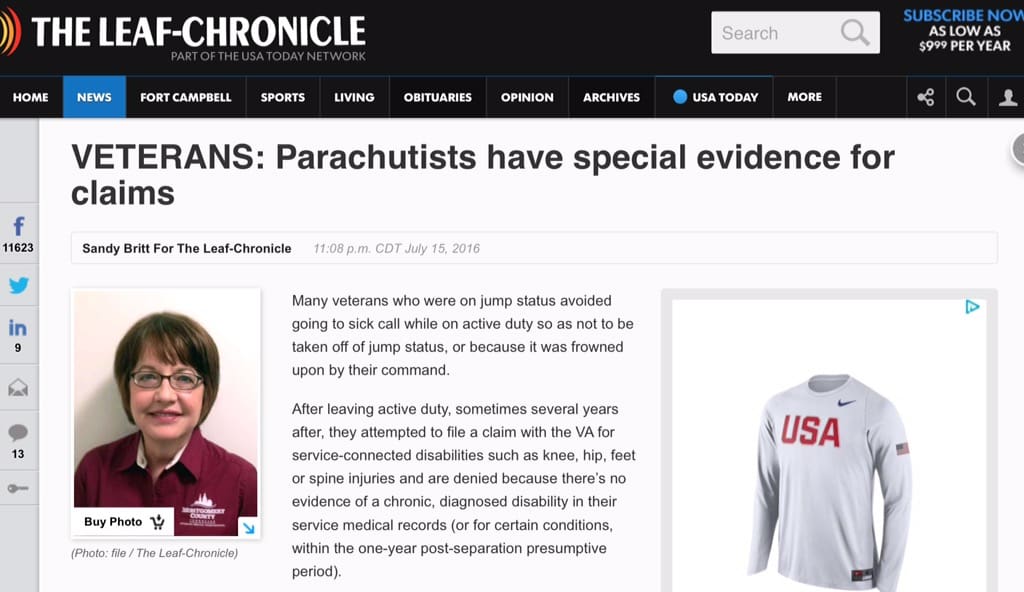Normally, I wouldn’t link to an article from a site owned by Gannett, but this op-ed is some good advice for US military Veterans who are seeking VA compensation for injuries arising from parachute duties. I served on jump status in both the Army and Air Force and the AF took it much more seriously from a medical viewpoint because parachutist duties were considered flight status. Consequently, parachutist were more likely to hide or at least downplay medical conditions in order to remain in status. After a career, they take their toll. If you’re in the same boat, this article by Sandy Britt For The Leaf-Chronicle is worth the read.
Many veterans who were on jump status avoided going to sick call while on active duty so as not to be taken off of jump status, or because it was frowned upon by their command….For example, veterans who were on jump status and earned one of the parachutist badges have concrete evidence of the number of jumps they completed. It’s a known medical fact that parachuting puts abnormal, traumatic pressure on joints, especially knees, feet, ankles, hips and spine, and as a result, chronic joint disabilities usually follow….read the rest at www.theleafchronicle.com/story/news/2016/07/16/veterans-parachutists-special-evidence-claims.



Best of luck to everyone. Unfortunately, the VA doesn’t care. My dad punched out of an F-4 in the early 80s and has been trying to get the VA to look at his back for years (since retirement). He’s still waiting…
Guess he shoulda had it looked at before he retired then? That is the point of the article.
Contact your local VFW or DAV, don’t go direct to VA, use advocates who have established rapport and contacts within VA.
Concur. DAV is helping me right now. I’ve been out for awhile.
He did have it looked at (obviously) and everything is documented. Now that he’s retired he can’t even get the VA to call him back to make an appointment.
The point is even documentation doesn’t do anything when it comes to the VA.
I’ll let you know then in 9yrs when I retire. 2yrs out from retirement “we” are supposed to start the process by addressing every medical issue that we experienced over our careers. A medical board reviews all “ailments” or injuries sustained during our service. This medical retirement board makes the decisions at what % of disability the member will retire with then carry over to the VA after separation from active service. There are two separate medical boards for the branch and then the VA. All service members are advised to start both of those around the 2yr mark before retirement.
Well, I wasn’t around at the time he retired. I know one issue is that he was full-time Air Guard AGR/technician the last part of his career (GS-12 during the week/O-5 on the weekends/deployments/mobilizations), not “active-duty” – USAF and medical support wasn’t the best at the “base” he worked out of.
Honestly, I don’t think he’s trying to get any %… he was just hoping for medical care from the VA – fortunately he still has FEHB from the “civilian” side. A returned phone call would be a good start.
In nine years when you retire and you get some first hand experience with the VA, your comments might have some value.
Nope, your not 100% correct. The military does document all medical problems. Do not wait until you’re ready to separate/retire to start documenting your “ailments”. Get them documented as they happen. Have personally seen many service members present to their clinic a month or two out from ETS wanting to get their problems addressed. It is usually too late at this point. Just trying to get them scheduled with the appropriated specialist is next to impossible on such a short time frame. Your branch of service will also perform all the medical evaluation boards. This info is then sent to VA for action. Supposedly, the new, kinder, gentler VA will fast track those who are within several months of separation. The VA makes all determinations on percentage of disability based off of the medical records and MEBs from your branch of service. I know this from first-hand experience.
Good luck starting two years out on flight status.